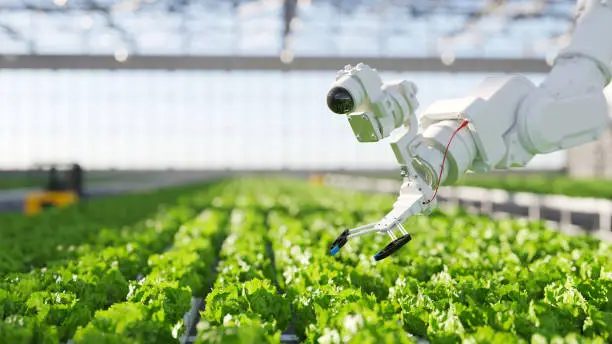The food and beverage industry, long known for its traditional methods of production and service, is undergoing a remarkable transformation fueled by the rise of artificial intelligence (AI). Over the last few years, AI has made its way into every facet of the food sector, from production lines to customer service, reshaping how businesses operate and interact with consumers. AI is not just a passing trend; it’s a technological revolution that’s becoming integral to the future of food production, distribution, and consumption.
AI’s impact on the food and beverage industry is profound. It offers solutions that help streamline operations, improve efficiency, enhance food safety, and enable companies to offer more personalized experiences to customers. Whether it’s predicting inventory needs, enhancing product quality, or offering personalized dining experiences, AI is helping food companies stay ahead in a competitive market. Additionally, as businesses in various industries, including fashion, explore content marketing strategies for fashion brands, the food industry is beginning to implement similar innovative marketing approaches. These advancements, coupled with AI-driven data analysis, are transforming how food brands promote themselves to a tech-savvy audience.

In this article, we will explore how AI is reshaping the food and beverage sector, discuss some challenges associated with its integration, and answer common questions related to the application of AI in the industry.
How AI is Impacting the Food and Beverage Industry
AI is revolutionizing the food and beverage industry in multiple ways. Its ability to automate processes, enhance decision-making, and improve customer experiences has made it a game-changer for businesses large and small. Below are some key areas where AI is having a significant impact.
1. Production Optimization
In production facilities, AI technology optimizes manufacturing processes by monitoring equipment, predicting maintenance needs, and analyzing large datasets to improve overall efficiency. For example, AI-powered sensors can detect changes in equipment performance, enabling preventative maintenance to reduce downtime.
2. Enhanced Food Safety and Quality Control
Food safety is a paramount concern, and AI is helping companies to elevate their quality control standards. Machine vision and AI-enabled sensors can detect contaminants, inconsistencies, or defects in products more accurately than human inspection. Through advanced image recognition, AI can analyze products on the assembly line in real-time, identifying issues and removing problematic items, ensuring that only the highest-quality products reach consumers.
3. Supply Chain and Inventory Management

AI enhances supply chain efficiency by analyzing real-time data to predict demand accurately, optimize inventory levels, and automate restocking processes. This technology minimizes waste by forecasting the precise quantities needed, especially for perishable goods. Additionally, predictive analytics in the supply chain help companies plan logistics more effectively, mitigating disruptions and improving cost-efficiency.
4. Customer Experience and Personalization
AI is also transforming customer service in the food and beverage industry, particularly in restaurants. AI-driven chatbots can assist with reservations, answer questions, and personalize dining suggestions. Moreover, customer data analysis allows restaurants to offer tailored experiences based on dining history, preferences, and real-time recommendations, making the customer experience more engaging and enjoyable.
5. Sustainability and Waste Reduction
AI plays a crucial role in advancing sustainability goals by monitoring resource consumption and food waste. Through AI analytics, companies can identify areas where energy or materials are being wasted and make adjustments to minimize environmental impact. By helping businesses reduce waste, optimize resources, and improve efficiency, AI contributes to a more sustainable food industry.
Challenges Integrating Artificial Intelligence
Despite the many benefits of AI, there are challenges to its integration into the food and beverage industry.
High Initial Investment Costs
AI technology, especially in its advanced forms, requires substantial initial investment in hardware, software, and skilled personnel. For small or medium-sized businesses, these costs can be prohibitive. While the long-term savings from increased efficiency, waste reduction, and improved customer experiences are significant, the upfront costs can make AI adoption seem like a distant goal for many companies.
Data Quality and Management

AI relies on large volumes of high-quality data to function effectively. This presents a challenge for businesses that have not yet digitized their operations or do not have robust data management systems in place. Collecting, storing, and processing accurate data is critical for AI to provide meaningful insights. Poor data quality or insufficient data can hinder AI’s performance and limit its effectiveness in improving business operations.
Workforce Adaptation and Skill Shortages
AI adoption requires a workforce skilled in data science, machine learning, and AI system management. There is a growing need for professionals who can manage, maintain, and optimize AI-powered systems, but there is currently a shortage of these skills in the food and beverage industry. Companies must invest in training their employees or hire new talent, which can be both time-consuming and costly.
Regulatory and Safety Compliance
The food and beverage industry is heavily regulated, and any changes to production processes must comply with strict safety standards. Integrating AI into production lines, quality control, and other critical areas must be done with careful attention to regulatory requirements. Ensuring that AI-powered systems meet industry standards and comply with safety regulations is essential to avoid costly fines or reputational damage.
Conclusion
The rise of AI in the food and beverage industry is not just a passing trend but a transformative shift that is improving production, enhancing food safety, personalizing customer experiences, and supporting sustainability efforts. While there are challenges in integrating AI into operations—such as high initial costs, data management issues, and workforce skill shortages—the potential benefits far outweigh the obstacles. As AI continues to evolve, businesses that embrace this technology will be well-positioned to stay ahead of the competition and meet the growing demands of consumers.
For companies looking to expand their digital presence and connect with their audience, incorporating AI into content marketing strategies is essential. Marketing Techology offers comprehensive SEO services and content marketing solutions that help food and beverage businesses—much like those in the fashion industry—develop powerful online strategies. Through content marketing for fashion brands and food businesses alike, brands can engage their audiences more effectively, promote their innovations, and stay at the forefront of this technological revolution.
Frequently Asked Questions
Can AI help with food safety and quality control?
Yes, AI plays a significant role in ensuring food safety and maintaining quality control. With machine vision and AI-powered sensors, companies can detect contaminants and defects more accurately than manual inspections. This technology helps businesses meet high standards of food safety and prevent recalls by identifying issues early in the production process.
How does AI improve customer experience in restaurants?
AI enhances customer experiences by personalizing dining recommendations, assisting with reservations, and providing faster service. AI tools analyze customer data to offer tailored menu suggestions, improve wait times, and deliver more personalized interactions, creating a better overall dining experience.
What role does AI play in inventory management?
AI helps optimize inventory by predicting demand and automating reordering processes. By analyzing data on sales patterns and customer behavior, AI ensures that businesses maintain appropriate stock levels, reduce waste, and prevent stockouts, helping businesses operate more efficiently and cost-effectively.


